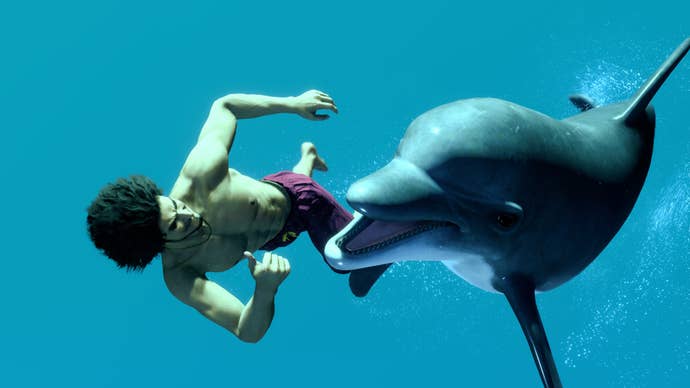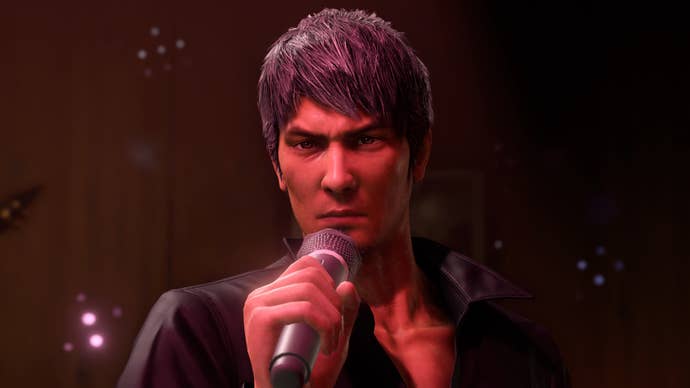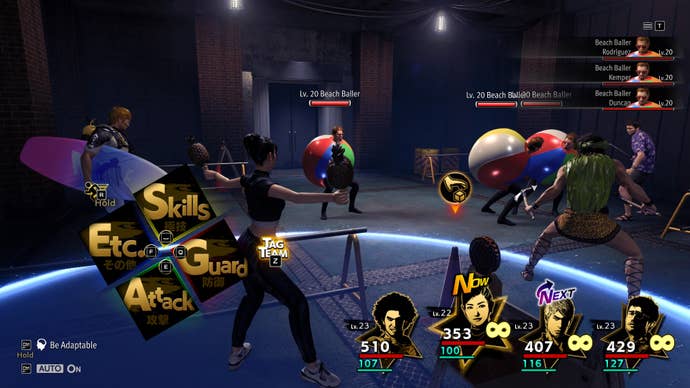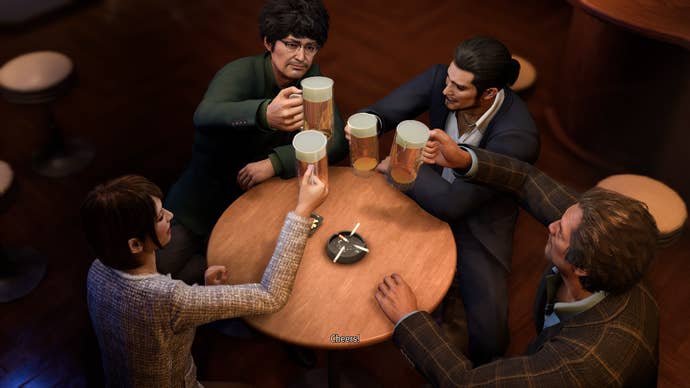“Yeah, but imagine what it says about your crab status,” declares Ichiban Kasuga as he strides along the sand of Aloha Beach under the Hawaiian sun, with his three mates in tow.
Kazuma Kiryu’s not having any of it. An intense debate about the living situation of the hermit crab they’ve spotted ensues. Kiryu doesn’t think four bedroom shells are a thing. Tomizawa reckons that in this economy, it’s probably a rental shell. Chitose’s sick of listening to them yack about nothing and decisively shuts the convo down with a sarky quip.
Five minutes later, Ichiban falls asleep on a lounger and a baby bird nests in his hair. “I should probably get on with saving the world at some point”, I think to myself after barely managing to carefully guide Kasuga to a mini-mart that sells bird food before his neck gave out.
If you’re anything like me, you’ll probably end up thinking something along those lines at numerous points throughout your time with Like A Dragon: Infinite Wealth, the gargantuan latest offering from RGG Studio. Sure, you’ve got a lengthy and drama-filled main story that somehow manages to be an outstanding follow-up to both Yakuza: Like A Dragon and Like A Dragon Gaiden: The Man Who Erased His Name sitting right there, but it can wait for a little bit while you meander around the sun-drenched streets of paradise goofily bellowing ‘Hello’ and ‘Aloha’ at random locals.
Naturally, they all instantly become your mates, because the world Ichiban’s now living in is the kind of drunken tourist surrealist fantasy that can usually only be summoned by inhaling enough pints to induce alcohol poisoning in a whale or putting on your grandad’s copy of Carry On Abroad. Having conclusively proven that he knows what Dragon Quest (one of the best RPGs ever) is during his quest to become the Hero of Yokohama, Kasuga’s now trying to arrange a meeting with his mum, the main problem with that plan being that all of Hawaii’s criminals are trying to do the exact same thing.

This time around, in a shocking change of pace, the gang of friends helping him accomplish this task for most of the game is made up of a slightly stiff gentleman with a penchant for old school chivalry, a weedier fellow who’s proven to be adept at surviving what the world throws at him, and a woman who’s definitely got more sense than those two and Kasuga put together. In all seriousness, Infinite Wealth’s colourful cast of familiar faces and new additions – which it splits into two separate parties to match the fact it’s set in both Hawaii and the familiar climes of Japan – are definitely its greatest strength.
One accompanies Kasuga as he kicks the hornets nests of the Hawaiian underworld, while the other ends up being led by Kiryu, who ends up pursuing the threads of the story that lie in the familiar Yakuza series stomping grounds of Yokohama and Kamurocho. When I first came to play the game, I wasn’t sure what kind of role the latter would play and how it’d advance his story, but in a manner that makes brilliant use of the series’ tendency to let you nostalgically revisit iconic locations over and over again, it’s home to one of the most important Kiryu arcs in the character’s illustrious history.
These two sides of the Infinite Wealth experience, which naturally converge together as things escalate story-wise – in an admittedly similar fashion to the first game – and the huge array of the typically masterfully crafted side stuff to do all exist to allow Kasuga and Kiryu to form deep bonds with their entourages.

If you’re after something new, there’s the chance to snap sickos from Hawaii’s tourist trolley, play the Uber Eats version of Crazy Taxi, or fight your way up the new battling hierarchy extension of Yakuza: LAD’s wonderfully satirical Sujimon system. Instead of dishing out incredible apologies as a corporate bigwig, this time around Kasuga can even build up and run his own resort island using mechanics that are a bit like Fallout 4’s settlement system, in a mode that could very easily be its own game.
If you prefer the classics, you can hit up one of Japan’s arcades, try out every eatery you come across, or do a bit of karaoke. As you wander, you’ll get to know each other better through countless little chats and interactions, all of which feel naturally funny, genuine, or both. Then, once you’re all puffed out, it’s back to Survive bar, – or its Hawaiian equivalent Revolve – for some one on one chats and the chance to recharge.
That loop probably sounds familiar to veterans of Kasuga’s first adventure, but you’ll be glad to know that Infinite Wealth’s version of the other gameplay loop that defined the experience of playing that game is a lot less of a dull time sink. Don’t get me wrong, you’re still in for plenty of grinding as you slam, smash, and shoot your party up to level 50, as well as guide them to mastery of the game’s smorgasbord of new and old jobs, but the difficulty spikes don’t feel anywhere near as jarring or frustrating this time around.

Part of this is probably down to me learning to go dungeon running a bit more often without being told to, but there’s certainly nothing as bad as a sudden jump from about level 35 to level 50 right as the game reaches its final third. That said, there are still plenty of fights you’ll have to prep for by spending hours running through underground haunts that’re incredibly boring visually, which is pretty much my biggest gripe with the game.
It’s not a big thing, but given how much effort RGG has clearly put into making the enemy types, weapons, and jobs – like the cowboy-themed desperado and the tropical pyrodancer – feel and look interesting, it still seems like a missed opportunity to have a lot of the fighting take place with the permanent backdrop of dingy concrete. Maybe the slightly robotic or artificial feel it gives these key areas wouldn’t feel so incongruous if the rest of Infinite Wealth didn’t feel so, well, alive.
Because, at the end of the day, the colourful and sturdy string that binds Infinite Wealth, its motley crew of very well-written main characters, the wider cast that get caught in their orbit, and all of the wackier stuff that’s going on together so well is the emotional ups and downs of the human experience.

It’s a game about finding out who your mates are, and that they’ll be there for you no matter whether you need a good laugh, a telling off or a helping hand.
Like a Dragon: Infinite Wealth is out January 26. This review was written using a PC code provided by the publisher.











Add comment